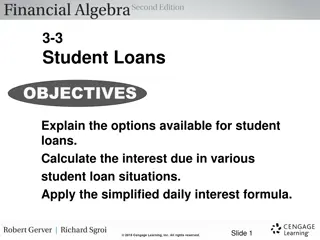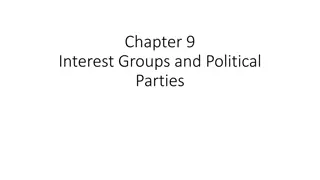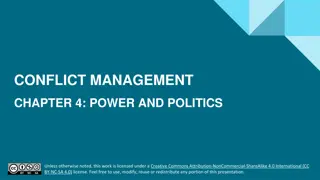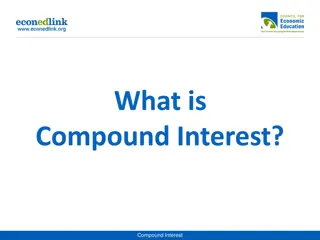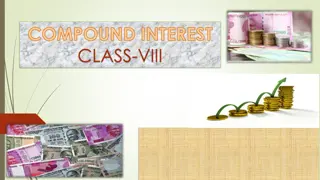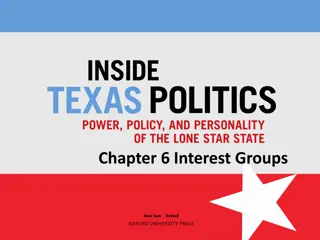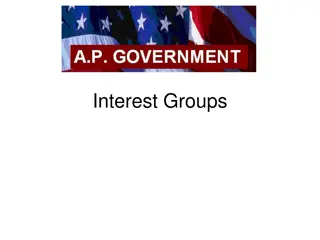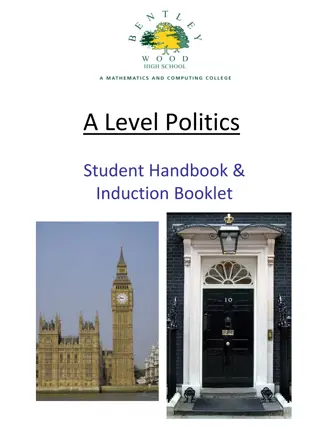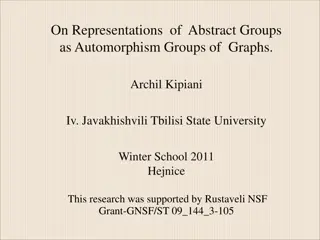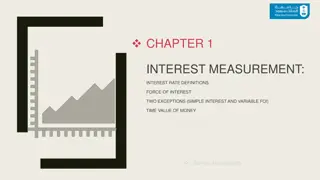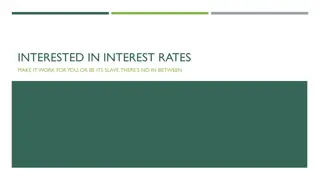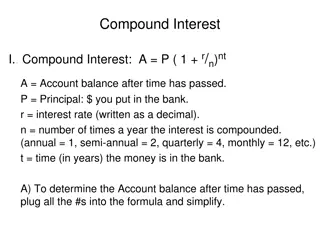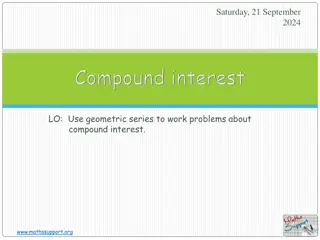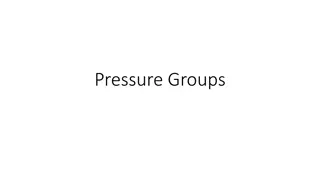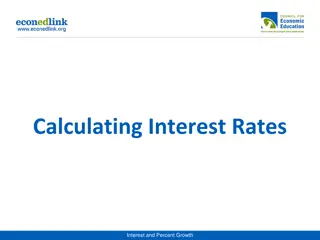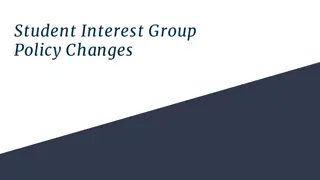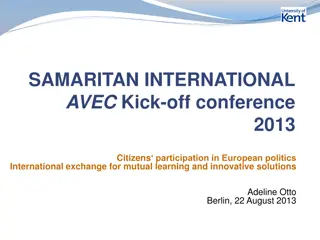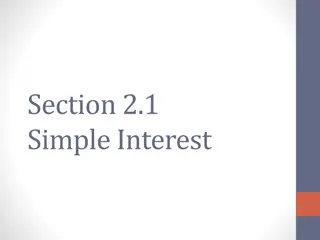Understanding the Role of Interest Groups in Politics
Interest groups are organizations with shared policy goals that influence the policy process. They differ from political parties as they focus on specific policies. Theories of interest group politics include pluralist, elite, and hyperpluralist perspectives. Hyperpluralism suggests that groups become too powerful, leading to contradictory policies. Success of interest groups depends on overcoming challenges such as the free-rider problem and effectively mobilizing members.
Download Presentation

Please find below an Image/Link to download the presentation.
The content on the website is provided AS IS for your information and personal use only. It may not be sold, licensed, or shared on other websites without obtaining consent from the author. Download presentation by click this link. If you encounter any issues during the download, it is possible that the publisher has removed the file from their server.
E N D
Presentation Transcript
INTEREST GROUPS Edwards Chapter 10
THE ROLE OF INTEREST GROUPS Interest group An organization of people with shared policy goals entering the policy process at several points to try to achieve those goals Interest groups pursue their goals in many arenas. Interest groups are distinct from parties. Political parties fight election battles; interest groups do not field candidates for office but may choose sides. Interest groups are policy specialists; political parties are policy generalists.
THEORIES OF INTEREST GROUP POLITICS Pluralist Theory Politics is mainly a competition among groups, each one pressing for its own preferred policies. Elite Theory Societies are divided along class lines and an upper-class elite rules, regardless of the formal niceties of governmental organization. Hyperpluralist Theory Groups are so strong that government is weakened. This is an extreme, exaggerated form of pluralism.
THEORIES OF INTEREST GROUP POLITICS: HYPERPLURALISM Subgovernments Networks of groups that exercise a great deal of control over specific policy areas. Consist of interest groups, government agency, and congressional committees that handle particular policies Also known as iron triangles The hyperpluralist critique Groups have become too powerful as the government tries to appease every interest. Many subgovernments (iron triangles) aggravate the process. Trying to please every group results in contradictory policies.
WHAT MAKES AN INTEREST GROUP SUCCESSFUL? The Surprising Ineffectiveness of Large Groups Potential group: all the people who might be interest group members because they share a common interest Actual group: the part of the potential group consisting of members who actually join Collective good: something of value that cannot be withheld from a group member
WHAT MAKES AN INTEREST GROUP SUCCESSFUL? Free-Rider Problem Some people don t join interest groups because they benefit from the group s activities without officially joining. Bigger the group, larger the problem Large groups are difficult to organize Olson s law of large groups: The larger the group, the further it will fall short of providing an optimal amount of a collective good. Overcome Olson s law by providing selective benefits: Goods that a group can restrict to those who pay their annual dues
WHAT MAKES AN INTEREST GROUP SUCCESSFUL? Small groups are better organized and more focused on the group s goals. Consumer groups have a difficult time getting significant policy gains because the benefits are spread over the entire population. Public interest lobbies seek a collective good, the achievement of which will not selectively and materially benefit the membership activities of the organization.
WHAT MAKES AN INTEREST GROUP SUCCESSFUL? Intensity Single-Issue groups: groups that focus on a narrow interest, dislike compromise, and often draw membership from people new to politics Groups may focus on an emotional issue, providing them with a psychological advantage. Intensity encourages non-conventional means of participation, i.e. protests
WHAT MAKES AN INTEREST GROUP SUCCESSFUL? Financial Resources Not all groups have equal amounts of money. Monetary donations usually translate into access to the politicians, such as a phone call, meeting, or support for policy. Wealthier groups have more resources and presumably more access but they do not always win on policy.
HOW GROUPS TRY TO SHAPE POLICY Lobbying communication by someone other than a citizen acting on his own behalf, directed to a governmental decision maker with the hope of influencing his decision Two basic types of lobbyists: Regular, paid employees of a group Temporary hires
HOW GROUPS TRY TO SHAPE POLICY Lobbying Lobbyists: are a source of information help politicians plan political strategies for legislation help politicians plan political strategies for reelection campaigns are a source of ideas and innovations Mixed evidence as to whether lobbying works
INDUSTRIES BIG SPENDERS ON LOBBYING, 2009-2011
HOW GROUPS TRY TO SHAPE POLICY Electioneering Direct group involvement in the election process Groups can help fund campaigns, provide testimony, and get members to work for candidates; some form PACs. Political Action Committee (PAC): Political funding vehicles created by 1974 campaign finance reforms, PACs are used by interest groups to donate money to candidates. PACs help pay the bill for increasing campaign costs. Most PAC money goes to incumbents.
HOW GROUPS TRY TO SHAPE POLICY Litigation If an interest group fails in one arena, the courts may be able to provide a remedy. Interest groups can file amicus curiae briefs to influence a court s decision. amicus curiae: briefs submitted by a friend of the court to raise additional points of view and present information not contained in the briefs of the formal parties Class Action lawsuits permit a small number of people to sue on behalf of all other people similar situated.
HOW GROUPS TRY TO SHAPE POLICY Going Public Because public opinion makes its way to policymakers, groups try to: cultivate a good public image to build a reservoir of goodwill with the public use marketing strategies to influence public opinion of the group and its issues advertise to motivate and inform the public about an issue
TYPES OF INTEREST GROUPS Economic Interests Labor Agriculture Business Environmental Interests Equality Interests Consumer and Public Interest Lobbies
UNDERSTANDING INTEREST GROUPS Interest Groups and the Scope of Government Interest groups seek to maintain policies and programs that benefit them. Interest groups continue to pressure government to do more things. As the government does more, does this cause the formation of more groups?
SUMMARY Group theories: pluralism, elitism, and hyperpluralism A number of factors influence a group s success, i.e., being small Interest groups affect policy process through lobbying, electioneering, litigation, and going public.



